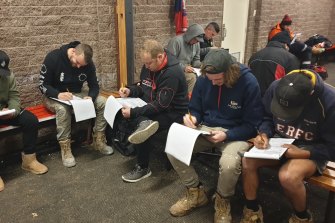LGBT children are consistently saying they fear discrimination in sport settings, more than in any other environment. This leads many to avoid sport. Gay and bisexual boys play sport at half the rate of their peers.
Despite this evidence, I often hear sport leaders and government officials say “things are a lot better for gay people in sport these days.” We recently tested this perception.
Loading
We investigated what happens when LGB youth come out to their teammates in sport. We expected that those who came out would report much less homophobic behaviour (bullying, assaults, slurs, etc.) because peers would be respectful and coaches and PE teachers would protect them from harm. That’s not what we found.
Both boys and girls who came out to others in sport were significantly more likely to report homophobic victimisation than those who remained in the closet. For boys, nearly two-thirds (64 per cent) of those who came out reported abuse, compared with nearly half of those who remained in the closet (48 per cent). Most (82 per cent) gay and bisexual boys also said they tried to hide their sexuality from teammates.
Beyond Blue has found experiences of homophobic discrimination in sport is associated with clinical anxiety and depression, risk factors for suicide. This has caused alarm among public health experts because 26 per cent of Australian LGBT teens attempted suicide in 2019, compared to 5 per cent of straight teens.
Homophobic behaviour in youth sport is an issue of child protection. It leads LGB youth to hide their sexuality, drop out of sport, and in some cases, take their own lives. This is why there are no openly gay or bisexual male AFL players.
Loading
How do we fix this problem?
Ian Roberts, Australia’s first openly athlete, has been calling on sport and government leaders to protect young people from homophobic abuse since 1997. He recently said he is disillusioned by the many “empty promises” over the last quarter-century.
Roberts says the latest example involved the leaders of the AFL, NRL, Rugby, Football, and Cricket appearing together in 2014 on national television. They signed a commitment to be “world leaders” in “creating inclusive sporting cultures and eliminating homophobia in our sports.“
Five peer-reviewed studies have assessed their progress over the last six years. This research found most activity to address this problem is being driven by small charities, such as Pride Cup or Proud2Play, or community sport clubs, while the commitments made by the leaders of the AFL and the other sports have not been kept.

The players from the Yarra Glen Football Club take part in research conducted to better understand the drivers and harm caused by homophobic language in sport. The club has been at the forefront of tackling homophobia.Credit:Monash University
One of those papers, published in the world’s top sport industry journal, said governing bodies use rainbow-themed social media posts and pride games to create a false illusion (delusion) they are taking action on homophobia, when in reality, almost nothing is being done beyond “lip service or happy talk.”
Our own research has found the AFL has done less on the issue of homophobia than any other major sport in Australia, or globally.
Scientists have also found the Australian Sports Commission has turned a blind eye to homophobic abuse in sport. This is shown by Australia’s recent 10-year, Sport – 2030 sport strategy. It details programs for nearly every population group, including the elderly, regional Australians, and low-income youth.

Olympic legend Ian Thorpe campaigned in February 2020 on the Religious Discrimination Bill.Credit:Alex Ellinghausen
There is no mention of LGBT people nor of any funding to address homophobia in sport. One section even includes quotes from Ian Thorpe talking about his mental health but doesn’t mention he is gay.
This long-term strategy document is being used by the sport governing bodies to create their own strategies to maximise government funding. The omission of LGBT people needs to be urgently fixed and an investigation is needed to determine why homophobia in sport is consistently ignored.
Until governments and sport leaders start prioritising protecting children from harmful homophobic behaviours in sport, we’ll be talking about the lack of openly gay male athletes in the AFL and other sports for many years to come.
Erik Denison is a behavioural science researcher at Monash University’s School of Social Sciences who investigates solutions to homophobia in sport.
Support is available from Beyond Blue on 1300 22 4636.








